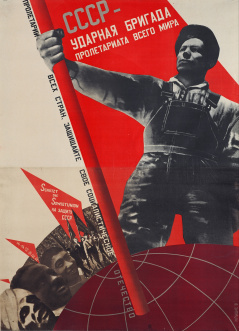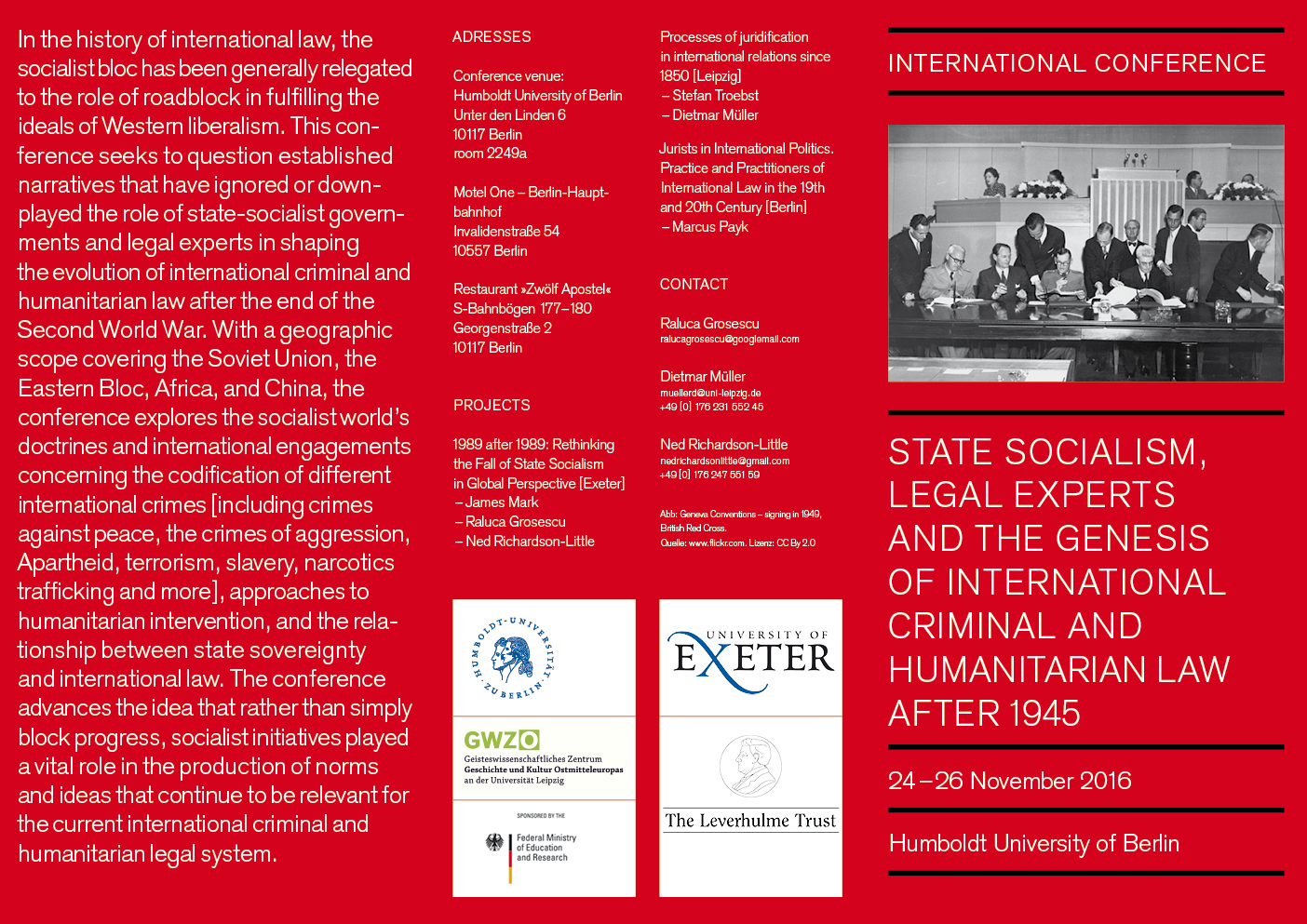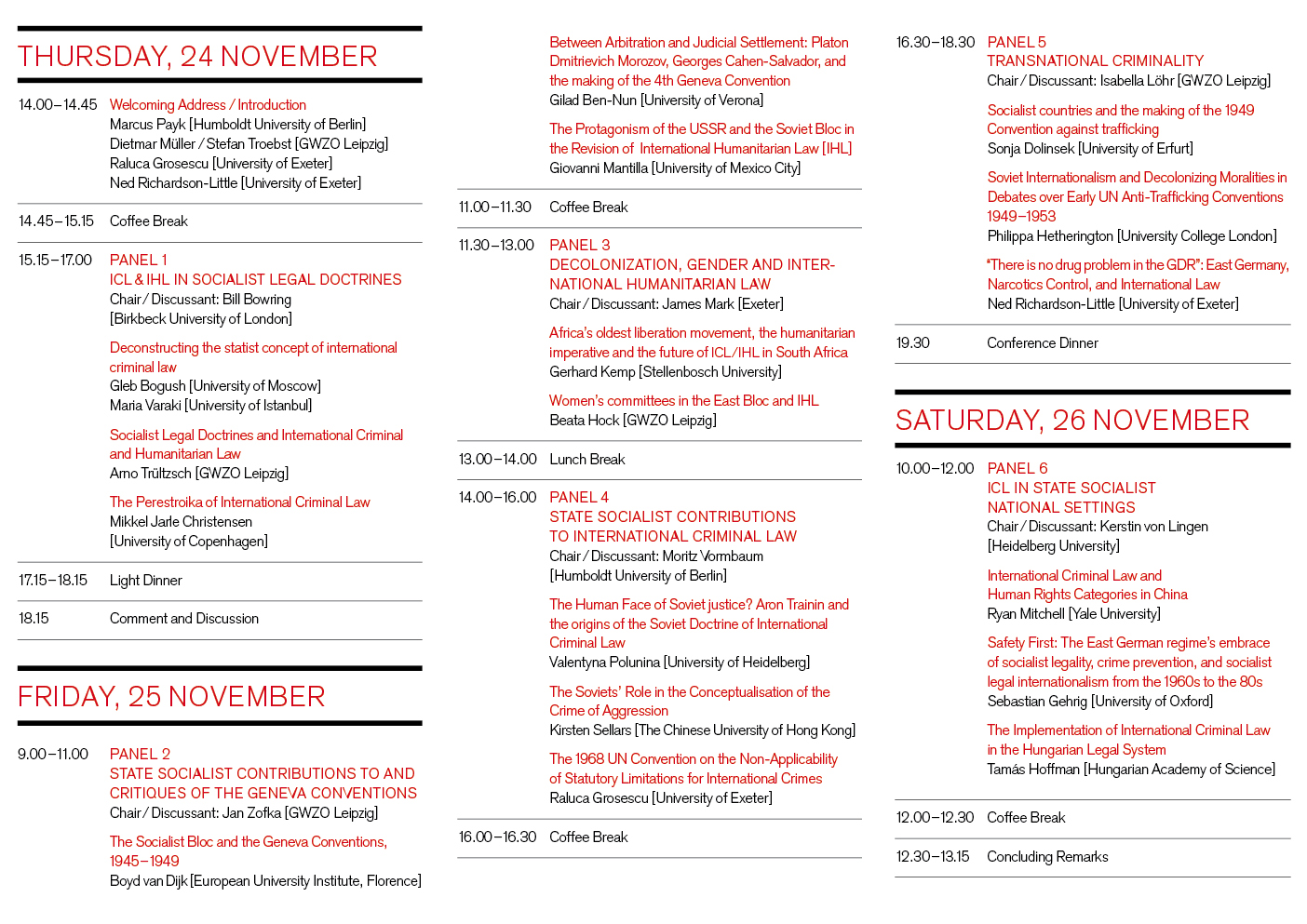State Socialism & International Criminal & Humanitarian Law after 1945 Conference Programme
Posted on 15 November, 2016 in1989 after 1989 Eastern Europe International Criminal Law International Humanitarian Law Socialism South Africa Transitional justice

State Socialism, Legal Experts and the Genesis of International Criminal and Humanitarian Law after 1945
November 24-26, 2016
 Conference Venue:
Conference Venue:
Humboldt University of Berlin
Unter den Linden 6
10117 Berlin
Room 2249a
The programme for our international collaborative conference with the Leipzig Centre for the History and Culture of East-Central Europe (GWZO), and the Humboldt University of Berlin is now available. It will take place on the 24-26 November, 2016 at Unter den Linden 6, Room 2249a, Humboldt University of Berlin, Germany.
It brings together 3 research projects – 1989 after 1989, Processes of Juridification in International Relations since 1850 based at Leipzig and Jurists in International Politics Practice and Practitioners of International Law in the 19th and 20th Century based in Berlin.
Conference Synopsis
In the history of international law, the socialist bloc has been generally relegated to the role of roadblock in fulfilling the ideals of Western liberalism. This conference seeks to question established narratives that have ignored or downplayed the role of state-socialist governments and legal experts in shaping the evolution of international criminal and humanitarian law after the end of the Second World War. With a geographic scope covering the Soviet Union, the Eastern Bloc, Africa, and China, the conference explores the socialist world’s doctrines and international engagements concerning the codification of different international crimes (including crimes against peace, the crimes of aggression, Apartheid, terrorism, slavery, narcotics trafficking and more), approaches to humanitarian intervention, and the relationship between state sovereignty and international law. The conference advances the idea that rather than simply block progress, socialist initiatives played a vital role in the production of norms and ideas that continue to be relevant for the current international criminal and humanitarian legal system.
The conference commences at 14:00 on the 24 November with a welcome address and introduction from the conference organisers – Marcus Payk, Humboldt University of Berlin; Dietmar Mueller and Stefan Troebst, GWZO Leipzig; Raluca Grosescu, University of Exeter and Ned Richardson-Little, University of Exeter. Papers will then be presented that deal with International Criminal Law and International Humanitarian Law in socialist legal doctrines.
Panels on the following day will include papers on state socialist contributions to and critiques of the Geneva Conventions; decolonisation, gender, and International Humanitarian Law, state socialist contributions to International Criminal Law; and Transnational Criminality. The final day will debate International Criminal Law in state socialist national settings and will include case studies from China and Hungary.
To register your interest in attending this conference please contact Raluca Grosescu and Dietmar Mueller
More information on the conference can be found on our conference pages.
Human Rights after 1945 Conference Report Published
Posted on 29 June, 2016 in1989 after 1989 Eastern Europe Globalisation Human Rights Post Socialism Rethinking 1989 Socialism

The conference Human Rights after 1945 in the Socialist and Post-Socialist World took place on the 3 – 5 March 2016 at the German Historical Institute, Warsaw. It was a collaborative conference between 1989 after 1989; the German Historical Institute Warsaw; Georg-August University of Göttingen and the London School of Economics. The aim of the conference was to highlight the role and historical agency of the socialist world in the history of human rights.
The conference report is now available on our conference pages and on Geschichte Transnational. It summarises papers presented across 6 panels covering topics such as state socialism, human rights and globalisation; how human rights is defined internationally; state socialist conceptualisation of rights and human rights; socialist foreign policy; transnational movements and flows; and political dissent in relation to the global history of human rights.
The importance of analyzing vernacular human rights, i.e. analyzing when and how people used human rights languages [5], was one of the leitmotifs of the conference. The issue of teleology and normativity in historical human rights research was another major topic. Consequently, many papers presented stories of failures that contradict positivist narratives and challenge policy-orientated narratives of democratic transition. Parallel to transnational and international human rights history, the role of the state in human rights history was another key issue of the conference. Bringing the state back in, human rights can also be seen as an element of legal history – a promising approach embedding the highly normative notion of human rights in a wider legal history context. This conference brought together scholars working on various regions and actors in a truly fruitful manner. It linked different approaches and perspectives on the history of human rights in a way that contributed to an urgently needed, more complex understanding of the socialist world’s role in human rights history.
Read the full conference report.
[Top]Human Rights after 1945 in the Socialist and Post-Socialist World Conference Programme
Posted on 29 February, 2016 in1989 1989 after 1989 Cold War Globalisation Human Rights Socialism

March 3-5, 2016
German Historical Institute Warsaw
Conference Room, 3rd Floor
Organizers:
German Historical Institute Warsaw
1989 after 1989: Rethinking the Fall of State Socialism in Global Perspective
Georg-August University of Göttingen
Synopsis
 As both human rights and globalization have emerged as dynamic fields of historical and sociological research, the “socialist world” is relegated to a supporting role in the triumph of Western capitalism and liberal democracy. The aim of this conference is to question established narratives that have ignored or downplayed the role of socialist ideas, practice, and experts—be they state officials, loyal intellectuals or dissident activists — in the development of international human rights ideas, discourses, and systems in the post-war era. With a geographic scope that covers the Soviet Union, the Eastern Bloc, Yugoslavia and China, we hope to show that the socialist world did not just react passively to Western human rights politics, but was a vital participant in the production of global human rights with legacies that continued past the revolutions of 1989. By examining the socialist contribution to the evolution of human rights, we hope to contribute to revising standard narratives of globalization that focus exclusively on the perceived winners of these processes.
As both human rights and globalization have emerged as dynamic fields of historical and sociological research, the “socialist world” is relegated to a supporting role in the triumph of Western capitalism and liberal democracy. The aim of this conference is to question established narratives that have ignored or downplayed the role of socialist ideas, practice, and experts—be they state officials, loyal intellectuals or dissident activists — in the development of international human rights ideas, discourses, and systems in the post-war era. With a geographic scope that covers the Soviet Union, the Eastern Bloc, Yugoslavia and China, we hope to show that the socialist world did not just react passively to Western human rights politics, but was a vital participant in the production of global human rights with legacies that continued past the revolutions of 1989. By examining the socialist contribution to the evolution of human rights, we hope to contribute to revising standard narratives of globalization that focus exclusively on the perceived winners of these processes.
Conference Programme
Thursday, 3 March 2016
14:00-14:30
Welcoming Address
Ruth LEISEROWITZ (German Historical Institute Warsaw)
14:30-15:30
Introductory Panel: State Socialism, Human Rights and Globalization: In Search of a New Narrative
Hella DIETZ (Georg-August University of Göttingen)
Ned RICHARDSON-LITTLE (University of Exeter)
Robert BRIER (London School of Economics)
15:30-16:00 Coffee break
16:00-18:00
Panel 1: Defining Human Rights Internationally
Steven JENSEN (Danish Institute for Human Rights)
Defining the Social in the Global: Social Rights, UN Diplomacy and the Emergence of International Non-Discrimination Norms and Politics, 1950-1960
Alexander OSIPOV (European Centre for Minority Issues)
The Soviet Union’s Involvement in the Establishment of the European Minority Rights Regime
Discussant: Arnd BAUERKÄMPER (Free University Berlin)
19:00 Conference Dinner
Friday, 4 March 2016
09:00-11:00
Panel 2: State-Socialist Conceptions of Rights and Human Rights
Jennifer ALTEHENGER (King’s College London)
Rights, Not Human Rights: Communist China’s National Constitution Discussion, 1954
Michal KOPEČEK (Institute for Contemporary History, Prague and Charles University, Prague)
Socialist Conceptions of Human Rights and its Dissident Critique
Todor HRISTOV (University of Sofia)
Rights to Weapons: Human Rights as a Resource in Workplace Conflicts in Late Socialist Bulgaria
Discussant: Paul BETTS (Oxford University)
11:00-11:30 Coffee Break
11:30-13:00
Panel 3: Tolerance, Difference, and Rights under Socialism
Ivan SABLIN (University of Heidelberg)
Illusive Tolerance: Buddhism in the Late Soviet State
Zhuoyi WEN (Hong Kong Institute of Education)
Contesting Cultural Rights in Post-socialist China
Discussant: tba
13:00-14:30 Lunch break
14:30-16:00
Panel 4: Human Rights as Socialist Foreign Policy
Sebastian GEHRIG (Oxford University)
The Fifth Column of the Third World? The East German Quest for International Recognition through UN Rights Discourses
Jens BOYSEN (German Historical Institute Warsaw)
Polish Engagement in the United Nations as a Tool for Justifying Communist Rule in Poland and Gaining Leeway in the Warsaw Pact
Discussant: Robert BRIER
(London School of Economics)
16:00-16:30 Coffee Break
16:30-18:00
Panel 5: Transnational Movements and Flows
Christie MIEDEMA (University of Amsterdam)
Negotiating Space for International Human Rights Activism: Amnesty International in Eastern Europe before 1989
Rósa MAGNÚSDÓTTIR (University of Aarhus)
Soviet-American Intermarriage: Transnational Love and the Cold War
Discussant: James MARK (University of Exeter)
19:00 Dinner for the conference participants
Saturday, 5 March 2016
9:00-11:00
Panel 6: Dissent and Human Rights
Simone BELLEZZA (University of Eastern Piedmont)
The Right to Be Different: Ukrainian Dissent and the Struggle Against a Global Consumerist Cultural Standardization
Hermann AUBIÉ (University of Turku)
Between Loyalty and Dissent: Revisiting the History of Human Rights in China Through the Discourse of Chinese Intellectuals and Dissidents
Zsófi a LÓRÁND (European University Institute, Florence)
Feminist Dissent, Activism for the Elimination of Violence against Women, and the Human Rights Discourse in Yugoslavia in the 1970s-1980s
Discussant: Celia DONERT (University of Liverpool)
11:00-11:30 Coffee Break
11:30-13:00
Concluding Panel: The Place of State Socialist Societies in the Global History of Human Rights
Paul BETTS (Oxford University)
James MARK (University of Exeter)
Celia DONERT (University of Liverpool)
Call for Papers: Human Rights after 1945 in the Socialist and Post-Socialist World
Posted on 12 October, 2015 in1989 after 1989 Communism Globalisation Human Rights Post Socialism Socialism

German Historical Institute, Warsaw
March 3 – 5, 2016
Call for Papers Deadline: 27 November 2015
Human Rights after 1945 in the Socialist and Post-Socialist World
Histories of late twentieth century global change have focused on its perceived winners on a macro-scale: democratic capitalism, global markets and individual rights. In such formulations, the “socialist world” and its history appear irrelevant to understanding global processes and unable to inform liberal Western democratic societies.
The global rise of human rights might look like a particularly striking case in point. The formal guarantees of rights in socialist societies, after all, seemed to have no substantial effect on these societies’ political and legal practices, and the debate on civil society in “the West” which east European human rights activists had inspired during the 1980s, did not survive socialism’s fall in that region.
In this conference, we want to question those narratives. Actors from the socialist world – be they state officials, loyal intellectuals or dissident activists – actively participated in international conflicts over the meaning of democracy, economic freedom, religious liberty and national self-determination in the post-war period. Socialist officials took part in drafting the U.N. covenants of 1966, in turning South African apartheid or repression in Chile into global causes célèbres or in promoting women’s rights. African socialists shaped human rights discourses by blending them with the struggle for self-determination, while Latin American activists grafted human rights to their Marxist ideas. Chinese Communists joined traditional ideas of cultural difference with Leninist ideology to create a distinct human rights discourse. Dissident intellectuals, on the other hand, did not necessarily take the West’s side in the Cold War when they criticized socialist realities, but developed innovative human rights vernaculars deeply shaped by their unique contexts. In sum, the “socialist world” did not just react passively to Western human rights politics, but was a vital participant in the story of the production of global human rights.
This conference seeks to explore how the socialist world can be written into the broader global narratives of the rise of human rights in the 20th century, and even revise these narratives. Our understanding of the “socialist world” is deliberately inclusive. It entails the socialist systems of eastern Europe, Eurasia, Africa, Southern and East Asia as well as socialist and Communist parties and movements more broadly, and anti-colonial or anti-dictatorial movements in the Global South.
We welcome papers from different disciplines and from diverse perspectives, whether dealing with official discourses, state policies, right experts, or national or transnational political movements.
We particularly encourage proposals on the following topics:
- rights cultures within socialist societies, including reflections on the global context of their construction;
- the contribution of socialist elites, experts and social groups to the global rise of human rights;
- connections across the socialist world in the production of conceptions of rights, including reflections on the role of international organizations or transnational movements;
- the importance of rights discourses for socialist regimes and movements in establishing legitimacy at home and abroad;
- the use of rights discourses by opposition movements, and the relationship between official/ alternative rights movements within socialist societies;
- the legacy of rights discourses within socialist and post-socialist societies today;
- comparisons, and connections between, the production of rights ideas in the socialist and non-socialist worlds;
- rethinking the role of rights and the collapse of socialist states;
- broader reflections on writing the socialist world into the history of rights;
- broader reflections on how these stories contribute to the rethinking of the story of cultural and political globalization.
This conference is the first in a series of meetings exploring how processes and practices that emerged from the socialist world shaped the re-globalized world of our times. Throughout, the legacies of this socialist engagement with globalising processes in the socialist and post-socialist world will also be an important point of interest.
Please send a brief abstract of 300-500 words, as well as a brief CV, by November 27, 2015, to Natalie Taylor at the University of Exeter (N.H.Taylor@exeter.ac.uk ). All organizational questions can be sent to Natalie Taylor. Academic queries should be sent to Hella Dietz (Hella.Dietz@sowi.uni-goettingen.de ).
Download the Call for Papers: Call for Papers Human Rights after 1945
Substantial funding opportunities for travel and accommodation are available, but we ask that potential contributors also explore funding opportunities at their home institutions.
This event is kindly supported by the German Historical Institute in Warsaw and the Leverhulme Trust-funded project 1989 after 1989: Rethinking the Fall of State Socialism in Global Perspective at the University of Exeter.
[Top]






